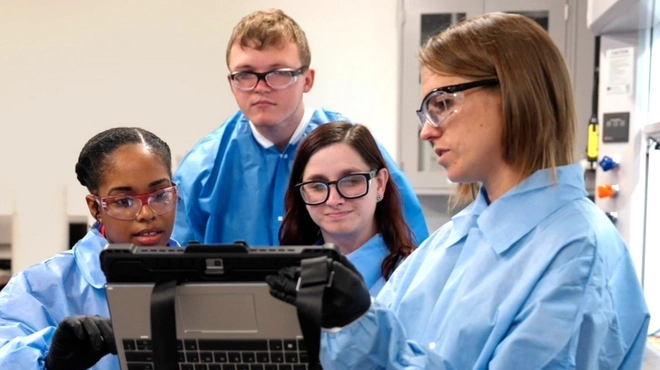One of the biggest game-changing advancements in cancer care came about 20 years ago when researchers learned that they could create medicines that selectively jam up cancer’s growth machinery without damaging the rest of the body. Today these medicines, called targeted therapies, are available for treating many forms of cancer.
Targeted therapies took center stage when Alice Shaw started her career as a physician-scientist caring for patients with lung cancer. Now, as Global Head of Translational Clinical Oncology at the Novartis Institutes for BioMedical Research (NIBR), Shaw aims to design innovative clinical trials to help bring potentially transformative cancer medicines and combinations of cancer medicines to patients.

“The advent of targeted therapies in solid tumors was a key moment for me and also for the whole field,” says Shaw. “These advancements gave everyone, including myself, hope that we would be able to continue to forge ahead and discover new targets and new therapies for patients in need.”
Shaw has dedicated her career to doing exactly that. For 15 years she worked as a clinical investigator at Massachusetts General Hospital in Boston, Massachusetts, in the US, where she ran clinical trials of many experimental medicines, conducted translational research, and cared for patients with lung cancer. During that time, she helped lung cancer care evolve from a field with few options for patients to one with many clinically proven therapies that enable patients to live longer, higher-quality lives.
Now at Novartis, Shaw is applying what she learned about running clinical trials to the task of designing them. Her focus has also expanded beyond lung cancer to all forms of cancer and beyond targeted therapies to a range of new approaches to cancer treatment, such as immunotherapies, cell and gene therapies, and radioligand therapies.
Shaw spoke to us about her vision for advancing oncology medicine.
We need to innovate in the clinical trial space.
Alice Shaw
What is translational clinical oncology?
We take basic discoveries made in a lab and bring them into the clinic in the form of an experimental drug. That whole process is what we call “translation.” When a drug moves into the clinic for the very first time, it enters what we call a Phase I or first-in-human trial.
It’s an important part of every drug’s development because it’s the first time a drug is being given to patients. We’re primarily testing safety and dosing of the drug we’ve developed, but we do also hope to see some evidence of clinical activity, meaning can the new drug induce any shrinkage of the cancer? We also embed scientific studies in Phase I trials that enable us to understand why some patients respond to treatment and others do not.
How does your previous experience help you bring new medicines into the clinic?
Before I came to Novartis, I was an academic clinical trial investigator running clinical trials. Clinical trial investigators are the eyes and ears in the clinic for pharmaceutical drug developers. They are seeing the patients and have the best understanding of how patients are tolerating a new drug and how compelling the anti-cancer effects are. Close collaboration between clinical investigators and drug developers is essential to accelerating the development of new cancer drugs.
Will you be able to stay connected with patients in your role at Novartis?
I maintain a half day per week where I still care for a number of my long-term patients with advanced lung cancer. But I spend the bulk of my time at Novartis, and here I feel like I still have an important connection to patients, but at a much broader level. Our group runs first-in-human trials across all different cancer types using all different treatment modalities. I feel fortunate to be in a position to help develop a range of different medicines that could impact so many different patients.
What is your vision for bringing new oncology medicines to patients?
Caring for cancer patients provides a constant reminder that patients are counting on us to deliver transformative therapies that improve their lives. My vision is that, based on our understanding of the underlying biology, we can bring new and effective cancer medicines to patients as quickly as possible.
To do this, we need to innovate in the clinical trial space. For instance, many Phase I trials now select patients based on the presence of a specific biomarker, such as a mutation in DNA that drives cancer. Biomarkers can help us to identify those patients who are most likely to respond to a given therapy, which helps us get the right therapies to the right patients faster.
What do you see as the future of oncology?
I’m excited about our pipeline of targeted therapies, immunotherapies, cell and gene therapies, and radioligand therapies as they all have tremendous potential. What’s really important, however, is that we bring them together.
Targeted therapies, for example, given as single agents can be very effective initially, but patients eventually develop resistance. To improve efficacy, we need to treat cancers with combinations of therapies. Combinations that include drugs with completely different mechanisms of action are of particular interest, such as targeted therapies and immunotherapies, or immunotherapies and radioligand therapies.
What challenges do you see ahead?
For some cancers, we don’t yet understand the key drivers of disease at the molecular level or we don’t yet have the tools to target these drivers. Our most important challenge is advancing the science and leveraging key scientific discoveries in the most efficient way to bring new cancer medicines to the clinic.
Main image by Fidelis Onwubueke.
The Head of Translational Clinical Oncology at Novartis shares her vision for advancing oncology medicine. #cancer #oncology



